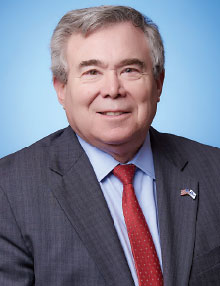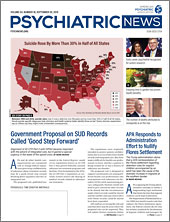APA is opposing the Trump administration’s attempt to nullify a longstanding legal settlement that limits the time that migrant children can be kept in detention.
The Department of Homeland Security (DHS) last month issued a rule that replaces the Flores Settlement Agreement, the federal consent decree that has set basic standards for the detention of migrant children and teenagers by the United States since 1997. The rule eliminates a 20-day cap for detaining migrant children accompanied by an adult and creates a new license regime that would make it easier for federal officials to detain children longer. The new rule requires the approval of a federal judge.
APA President Bruce Schwartz, M.D., said in a statement that the move by the administration will harm children. “A substantial body of research shows that stressful events during childhood can lead to long-term developmental, learning, and health problems, not to mention a heightened risk of depression, anxiety, and posttraumatic stress disorder. The Flores Settlement Agreement was intended to protect the well-being of children who are detained by immigration authorities, but the new rule would endanger their mental health by eliminating the 20-day limit on detainment and weakening licensing requirements of detention centers.”
The Flores Settlement Agreement is a 1997 settlement of lawsuits filed on behalf of minors by immigration advocates against what was then known as the Immigration and Naturalization Service (INS) for alleged maltreatment of migrant children. The settlement requires the government to release children from immigration detention without unnecessary delay to their parents, other adult relatives, or licensed programs. It also requires immigration officials to provide detained minors a certain quality of life, including food, drinking water, and medical assistance in emergencies.
The ruling applied to unaccompanied migrant children. The new rule takes particular aim at a 2015 reinterpretation of the Flores settlement by a federal district court that applied the Flores rules to children and teenagers accompanied by an adult. The Trump administration has cited the 2015 ruling as a cause of the dramatic increase in migrants seeking entry at the southern border.
“Human smugglers advertise, and intending migrants know well, that even if they cross the border illegally, arriving at our border with a child has meant that they will be released into the United States to wait for court proceedings that could take five years or more,” said Acting DHS Secretary Kevin McAleenan at a press conference announcing the administration’s new rule. “This key gap in our immigration framework comes from a 2015 reinterpretation of the Flores Settlement Agreement.”
He added, “This single ruling has substantially caused, and continued to fuel, the current family unit crisis and the unprecedented flow of Central American families and minors illegally crossing the border.”
The rule formulated by the administration creates a new licensing authority that would have the effect of allowing federal detention facilities to keep migrant children and the adults who accompany them across the border for the duration of their immigration proceedings rather than being released after 20 days (as required under the original licensing arrangement).
The new licensing arrangement could also weaken oversight of conditions at detention centers; many facilities are ill equipped to provide any form of mental health care, and there are concerns that children continue to be given psychotropic drugs without consent despite a 2018 court ruling requiring parental consent or a court order before drugs can be administered.
Immigration advocates say that the steep increase in border crossings is related more to migrants’ fleeing political turmoil in South and Central American countries. APA and other mental health advocacy organizations have emphasized the trauma many migrant families and children are likely to have experienced even before reaching the American border.
“The children and families seeking asylum at the U.S. borders are already coping with the effects of the stress and trauma of leaving their home countries,” Schwartz said. “Compounded by the current conditions of detention centers, we urge the administration to consider the long-lasting, harmful impacts of this policy and withdraw this rule.”
APA has joined other health and mental health organizations, including the AMA and the American Academy of Pediatrics, in an amicus brief filed on behalf of Jennie Lisette Flores, et. al. (the plaintiffs in the original 1997 Flores ruling) that is critical of the administration’s substitute rule (see box above). The same brief was also filed in support of a coalition of 20 states led by California Attorney General Xavier Becerra, who sued the administration to bar its Flores ruling.
“This new Trump rule callously puts at risk the safety and well-being of children,” Becerra said in a statement. “No child deserves to be left in conditions inappropriate and harmful for their age. We’re taking the Trump administration to court to protect children from the irreparable harm caused by unlawful and unnecessary detention.”
Joining Becerra in filing the lawsuit are the attorneys general of Connecticut, Delaware, Illinois, Maine, Maryland, Massachusetts, Michigan, Minnesota, Nevada, New Jersey, New Mexico, New York, Oregon, Pennsylvania, Rhode Island, Vermont, Virginia, Washington, and the District of Columbia. ■
The new rule issued by the Trump Administration is posted
here. The APA statement is posted
here. A video and transcript of the DHS press conference are posted
here. The statement from California Attorney General Xavier Becerra is posted
here.

